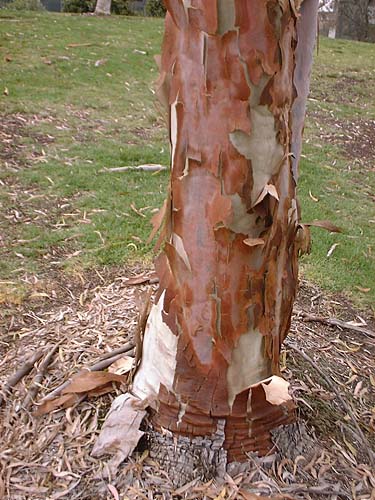The Japanese language has many poetic names for the seasons. One phrase that I’ve found particularly beautiful is take no aki, or “bamboo autumn.” It refers to the period in middle- to late-spring when leaves of some bamboos turn yellow and fall from the plants. In addition to the gorgeous built-in poetic analogy, I like how the phrase grounds a specific portion of the season by invoking a natural process that presumably would have been understood by a good portion of the population.
 When I take my lunch break during the week and head to the gym, I follow a path that takes me by a small cluster of eucalyptus trees planted in a patch of lawn. Several of the trees have beautifully smooth trunks which are covered with a delicately mottled silvery bark. Once a year, usually late in spring or early in summer, the bark exfoliates, dropping off in small chunks that reveal the surprise: a bumpy, pale ocher layer of new bark underneath.
When I take my lunch break during the week and head to the gym, I follow a path that takes me by a small cluster of eucalyptus trees planted in a patch of lawn. Several of the trees have beautifully smooth trunks which are covered with a delicately mottled silvery bark. Once a year, usually late in spring or early in summer, the bark exfoliates, dropping off in small chunks that reveal the surprise: a bumpy, pale ocher layer of new bark underneath.
 Another of the trees drops larger, thin, brittle sheets of red-brown bark, revealing a deliciously pale icy green below.
Another of the trees drops larger, thin, brittle sheets of red-brown bark, revealing a deliciously pale icy green below.
Many eucalyptus species have bark that exfoliates, as do many other trees, such as the sycamores that congregate in the moister areas of the local canyon bottoms. So…why shouldn’t we have a name for when that happens? Why shouldn’t we come up with ways to reattach language to natural processes and the world around us? Why not refer to this awkward transitional spring-summer period we’re in as “eucalyptus autumn?”
(Okay, okay, if you must quibble, not all of the 740-plus eucalyptus species shed their bark. And those that do, don’t do it at exactly the same time. But I vote for anything that grounds us more securely in the cycles of the world. And language, being such a fundamental component of our existence, seems like a great tool to use to accomplish the goal.)

Is “autumn” really appropriate in this case, though? I mean, for the bamboo it makes sense, as it’s referring to dropping of leaves, which we all expect in fall. Perhaps we should call it Barking Spring, which is less confusing about the time of year and a little more accurate (while still delightfully misleading) about the activity to which we refer?